16th October 2024
Sixteen gamers made it past the St Ives Michaelmas fair and through the more circuitous route to the games room to enjoy seven different games this session. Games selected covered all the genres, History, Space, Zombies, Nature, Building and Fireworks.
The early arrivals settled on Hanabi and managed two games of that before switching to their longer game of ZombieTown.
Hanabi is a simple card game with players cooperating to play coloured and numbered firework cards in order to build the best firework display. The twist is you cannot see your own cards so the other players need to give you clues as to which colours or numbers (but not both at the same time) you have so you can play them at the right time to enhance the display rather than stop it early!
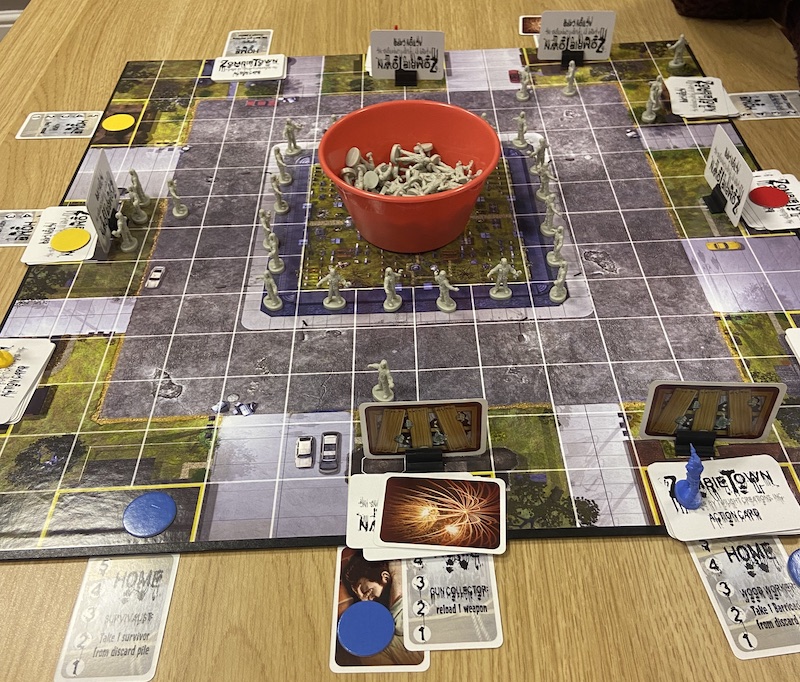
ZombieTown is a bit different to previous Zombie games played at the club. It is based in a town, with 12 houses around the edge. There is no way out of the town. At the centre of the town is a cemetery with 100 Zombies, who come out in all directions. Resources (guns, barriers, traps) are limited. You have four lives and need to survive 10 rounds. So players obviously cooperate with each other? Not at all!! Players compete for resources, may battle each other for houses, resources, or simply to reduce other player’s lives. Players can also use “survivors” to fight for them. Crucial to surviving (and winning) was the ability to reload. Neil and Steph chose home bases close to houses offering reloads. Graham didn’t but stole a reload house from Steph. The ability to reload enabled Graham to hold the base against Zombie onslaughts. Victory points were obtained from home bases held, loaded guns, Zombies killed, barriers intact, and survivors in play. Neil played a card at the very end which gave an extra round. He rapidly realised this was a mistake, as he was in a much better position before the new round. This helped Graham win! We were all learning the game, and getting used to the various aspects but are keen to play again.
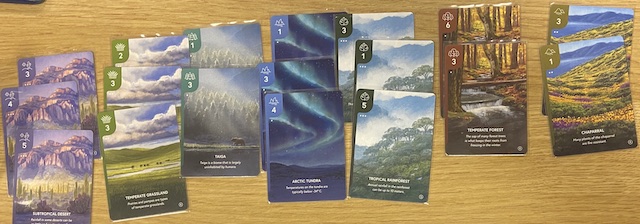
The next table had a quick game of biome collecting with Subastral. Now on its tenth club play see session 44 for a quick rules recap. In this game first time player Reynaldo managed a nice mixed biome score but was just pipped to victory by Jeremy’s best single biome having a times seven multiplier.
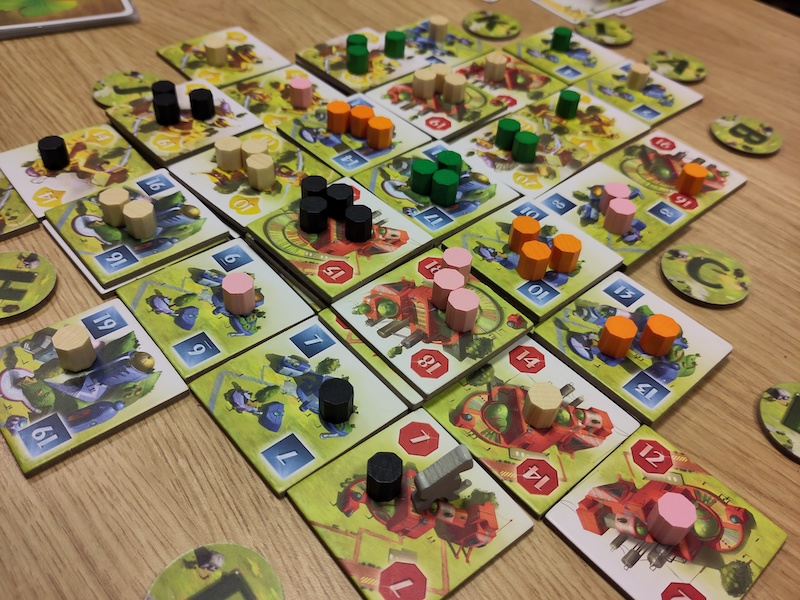
Ginkgopolis was back for a second play, with Iain and Jeremy being joined by 3 new intrepid utopian builders - Tasha, Tom and Reynaldo. After a quick run though the regulations and planning permissions (see session 72 for the rules) it was off to the future.
Everyone was busily getting into the swing of the different actions you can take, expanding the city or building a new level, and sometimes needing to go and get resources, until about half way through the game. It then became clear there was a definite construction of districts within the city, two of the largest ones were owned by Reynaldo who had been carefully capturing majority in those areas.
When the building tiles ran out for the first time, this signalled there wouldn’t be much more of the game left. So in two back to back moves Tom and Tasha wrestled control back from Reynaldo in both of his controlled districts. One of the interesting mechanics in the game is that after constructing a level of a building, the associated new building card is get added to the deck and the used building card is removed and put in the constructor’s tableau. Therefore, it is possible to get the building cards of those places just built. Reynaldo gambled on this by using the “new hand” token to discard and draw up a new hand of building cards to try and regain control of at least one of those districts back, but unfortunately it didn’t pan out.
In the end it was a joint win for Tasha and Tom (there aren’t any rules about point ties at the end of the game, just district scoring), with Iain and Reynaldo not too far behind, and Jeremy trailing in last place due to struggling for resources and tiles!
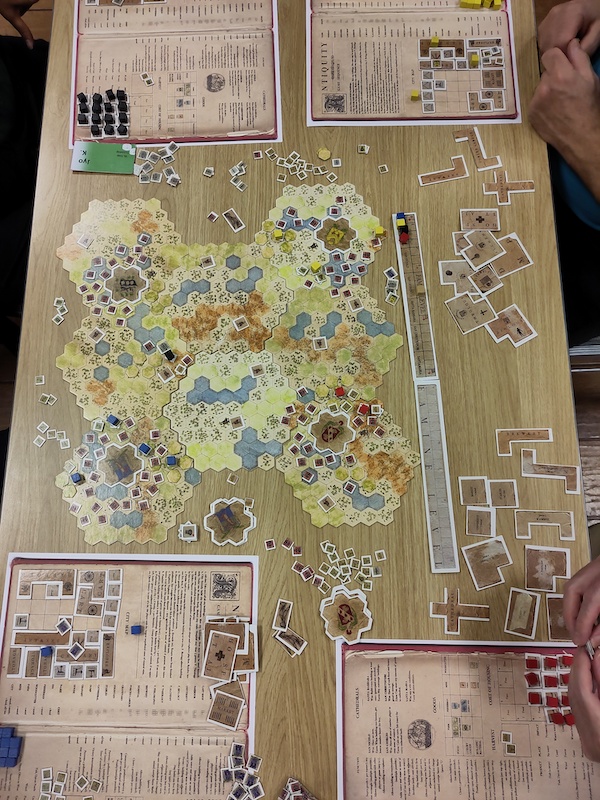
We don’t like to boast, but does your game come with 900 small card board counters? Yes, then you’re playing Antiquity by Splotter. Simon W. had pre-booked Antiquity on Discord for a full table of four, little did these three players understand what was to come. Perhaps most fun, you cannot win at the start of the game; you must first build a cathedral and dedicate it to a saint (which unlocks a win condition for you). To build a cathedral is one stone, one tiny little stone. What could be hard about that? Well, this game quickly becomes a nightmare as your food supply runs low leading to famine and graves; your economy pollutes the land and further pollution leads to more graves.
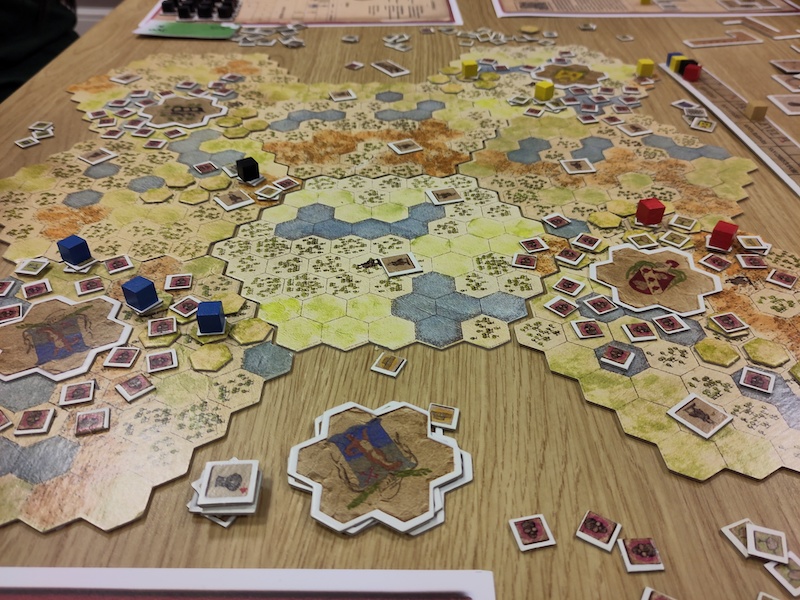
By the end of the game the beautiful and lush country side is turned into a wasteland; the lakes are full of poison; the cities are covered in graves; and for what? This is a game of squeezing everything you can from nothing, and still fighting against an ever rising tide of famine that will eventually drown every player. With inexperienced players it is very possible for no player to win, but at the heart of this game is a puzzle that if you could crack would lead your civilisation to a utopia. Splotter games are rather famous for being unforgiving, with little to help players or prevent them from making cataclysmic mistakes. Antiquity is an optimisation puzzle; perhaps a bit more stressful than some might like, but there’s fun to be had in the collective struggle.
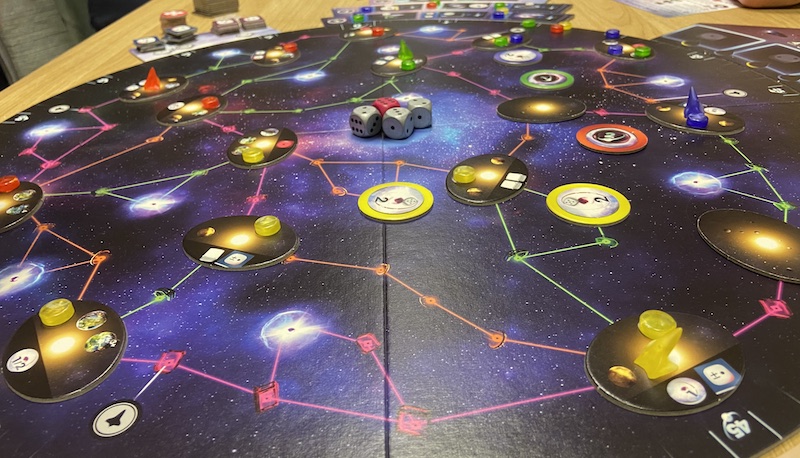
The final table picked Pulsar 2849 for some dice based worker placement space themed action. This was back for its third club play, first seen in session 26. There are many ways to score points in this game, the main ways being flying around and visiting planets, flying around and discovering pulsars first and then building and activating gyrodynes on them, researching technologies and activating transmitters. Each round starts with drafting two dice, lower value dice give bonuses to choosing first in later rounds or engineering cubes to spend on extra dice. Higher dice values let you fly further or access more powerful technologies, gyrodynes or transmitters. There is always something you can do with your dice but you may need to be adaptable with your plans if earlier players have blocked the slots you had been coveting.
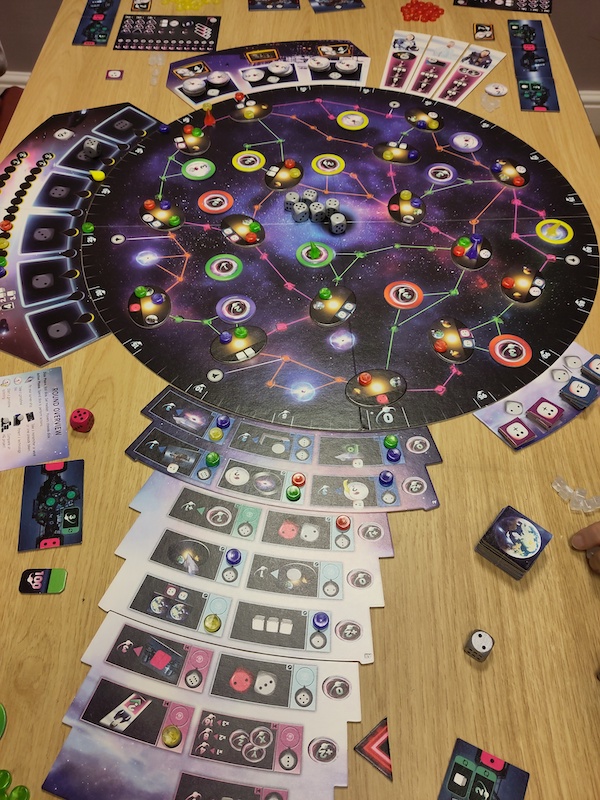
In the end Kathy J. had been relatively uncontested in choosing first most rounds but that meant she had lower value dice overall and despite a good pulsar/ spinning gyrodyne and technology score it could not match the number of planets Richie and Jason had visited and the end of game multiplier they achieved. The game seems a bit daunting at first as there are so many options but after a couple of rounds players had the hang of the pick and place mechanic and were having fun exploring the galaxy.
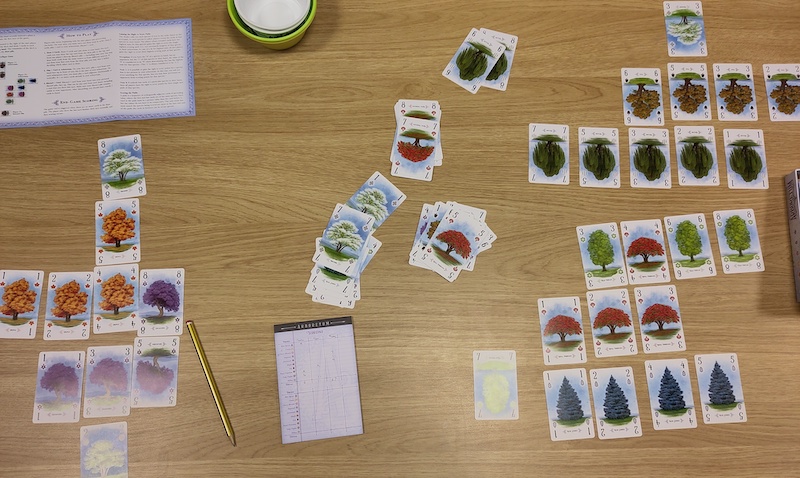
Then there was time for a quick turn at Arboretum to finish the night, a game of building pretty avenues of trees. There is a tableau placement element in trying to create paths of trees with ascending values but also bonuses for runs of tree types, but the trick is that you only score tree types if you have a matching tree type in your hand at the end of the game. This hand management element is important as other players cards at game end can mean you do not have the highest value for a certain tree type and now that lovely run of willow trees scores zero. It is quite cut-throat in the gardening world.
The next session is the 30th of October, things should be back to normal with less pumping disco beats and screams outside the window caused by the fair. Do join us for a gentle evening of varied games and keep an eye on Discord for any pre session suggestions, perhaps some spooky themed games considering the date?
- Total Session Attendance: 16
-
Board Games: